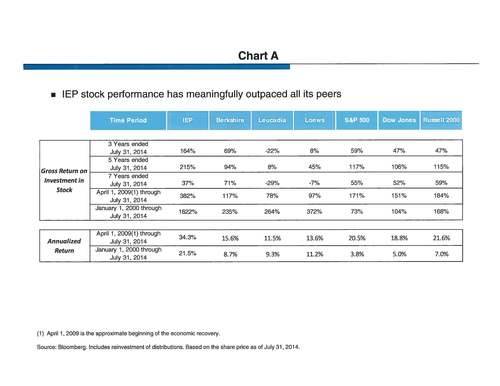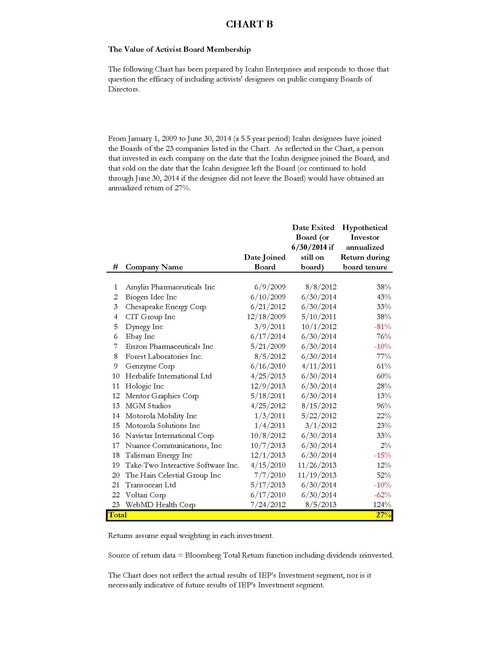Among other things, I’m known to be a “reductionist.” In my line of work you must be good at pinpointing what to focus on – that is, the major underlying truths and problems in a situation. I then become obsessive about solving or fixing whatever they may be. This combination is what perhaps has lead to my success over the years and is why I’ve chosen to be so outspoken about shareholder activism, corporate governance issues, and the current economic state of America. Currently, I believe that the facts “reduce” to one indisputable truth which is that we must change our system of selecting CEOs in order to stay competitive and get us out of an extremely dangerous financial situation. With exceptions, I believe that too many companies in this country are terribly run and there’s no system in place to hold the CEOs and Boards of these inadequately managed companies accountable. There are numerous challenges we are facing today whether it be monetary policy, unemployment, income inequality, the list can go on and on… but the thing we have to remember is there is something we can do about it: Shareholders, the true owners of our companies, can demand that mediocre CEOs are held accountable and make it clear that they will be replaced if they are failing. I am convinced by our record that this will make our corporations much more productive and profitable and will go a long way in helping to solve our unemployment problems and the other issues now ailing our economy. We can no longer simply depend on the Federal Reserve to keep filling the punch bowl.
Federal Reserve Chair Janet Yellen recently commented on our Monetary Policy at the International Monetary Fund saying, “Monetary policy faces significant limitations as a tool to promote financial stability.” She continued that, “Its effects on financial vulnerabilities, such as excessive leverage and maturity transformation, are not well understood and are less direct than a regulatory or supervisory approach.” Yellen’s comments suggest, and I agree, that we are in an asset bubble.
Adding to this, Standard & Poor’s issued a report just a few days ago titled, “How Increasing Income Inequality is Dampening U.S. Economic Growth and Possible Ways to Change the Tide.” In it they say: “Our review of the data, as well as a wealth of research on this matter, leads us to conclude that the current level of income inequality in the U.S. is dampening GDP growth, at a time when the world’s biggest economy is struggling to recover from the Great Recession and the government is in need of funds to support an aging population.”
There is also a dire situation regarding pension funds which supports the view that Main Street Americans are the ones falling victims to entrenched CEOs and Boards doing poor jobs at running companies. A study by Ray Dalio, founder of Bridgewater Associates, calculates 85% of public pension funds going bankrupt in three decades and only able to achieve 4% returns on their assets. These inexcusable numbers are mainly due to pension and mutual fund managers “voting with their feet” or simply voting for current management of companies in their funds, regardless of their effectiveness on shareholder value.
Our current system of corporate governance protects mediocre CEOs and boards that are mismanaging companies and this must be changed. With this system we will not meet the needs of Main Street America, nor will we be ready for when the asset bubble we have today bursts – whether it is the next one, five, ten, or 20 years. Nobel Laureate and professor of economics at Columbia University, Joseph Stiglitz recently told CNBC, “These very strong stock market prices are in a sense a symptom of the weak economy, not a symptom that we are about to have a strong recovery to our real economy.” He also said, “In the United States, from 2009 to 2012, 95 percent of the gains went to the upper 1 percent. Ordinary Americans are using up their savings.”
Currently, we must focus on the simple solution that I believe could alleviate many of these problems we are facing. The solution is shareholder activism. Icahn Enterprises L.P. (IEP) reported its Second Quarter 2014 results on August 5th and as I said, I am very pleased with our performance. What makes me especially happy is that I believe that IEP’s performance not only in Q2 but since 2000, gives testimony to my belief that activism, when properly practiced, meaningfully enhances value for all shareholders as well as the economy in general. If you bought IEP in the beginning of 2000 you would have an annualized return of 21.5% compared to the S&P 500’s 3.8% and if you bought IEP April 1 2009 you would have an annualized return of 34.3% compared to the S&P 500’s 20.5%, through July 31 2014.
Even more telling is the annualized return of a person who invested in 23 companies whose Boards Icahn designees joined between January 1 2009 and June 30 2014: if the person invested in each company on the date that the designee joined the Board and sold on the date that the Icahn designee left the Board (or continued to hold through June 30, 2014 if the designee did not leave the Board) they would have obtained an annualized return of 27%.
I believe that the main reason for our success is we adhere to the activism model which we have spent many years developing. What we essentially do is attempt to hold managements accountable through our rights as shareholders and seek to ensure the right people run the companies we invest in. We do not micromanage however. If a company is doing more poorly than its peers we take a hard look, and in a number of these cases the CEO is not the right person to be running the company.
True corporate democracy does not exist in America and as a result many unfit CEOs are not held accountable. Poison pills and other board tricks disenfranchise stockholders. As a result entrenched CEOs and Boards of Directors may be protected even if they are ineffective. Many large money managers agree but amazingly hardly anything is done about it - even though the most important thing in a company is its CEO. To this point, in a recent essay in the Wall Street Journal, Bill Gates discusses one of his and Warren Buffett’s favorite books, ‘Business Adventures’ by John Brooks. Gates says, “Brooks’s work is a great reminder that the rules for running a strong business and creating value haven’t changed. For one thing, there’s an essential human factor in every business endeavor. It doesn’t matter if you have a perfect product, production plan and marketing pitch; you’ll still need the right people to lead and implement those plans.”
The mantra of opponents of shareholder activists, such as lawyer Marty Lipton is that “short-termist” is synonymous with “shareholder activist.” But my record belies this statement. I have held many positions for long periods of time; some up to 30 years.
Again, I believe that the kind of shareholder activism that IEP practices has been extremely successful because we seek to bring true corporate democracy to the companies we are involved with through exercising our rights as shareholders to hold CEOs accountable and change unproductive management that needs to be changed. I believe that America needs this to correct the economic course we are on and push back against the approaching storm clouds resulting from the many problems we face today, including a major asset bubble that continues to grow.
Courtesy of Tumblr




Comments